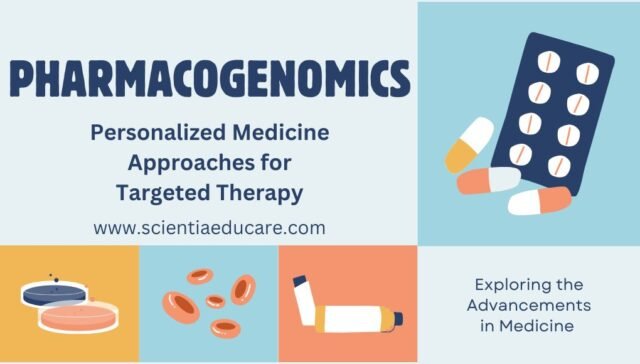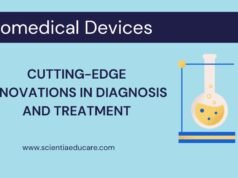Pharmacogenomics: Personalized Medicine Approaches for Targeted Therapy
Introduction
Pharmacogenomics is an emerging field that integrates genomics with pharmacology to develop personalized medicine approaches. It aims to tailor drug treatments based on an individual’s genetic makeup, enhancing efficacy and minimizing adverse effects. With advancements in DNA sequencing and bioinformatics, pharmacogenomics is transforming healthcare by providing targeted therapies for various diseases.
Pharmacogenomics in clinical practice,
Genetic testing for medication,
Personalized medicine for cancer,
Pharmacogenomics and drug metabolism,
How genetics affect medications.
Key Objectives of Pharmacogenomics:
- Understanding genetic variations that influence drug response.
- Developing personalized drug regimens.
- Reducing adverse drug reactions (ADRs).
- Enhancing drug efficacy through tailored treatments.
The Science Behind Pharmacogenomics
Pharmacogenomics relies on the study of Single Nucleotide Polymorphisms (SNPs) and gene-drug interactions to predict how patients will respond to medications. Genetic differences in drug-metabolizing enzymes, transporters, and receptors play a crucial role in determining the effectiveness and safety of drugs.
How Genetics Influence Drug Response
- Drug Metabolism Variability:
- Fast Metabolizers: Drugs are broken down quickly, reducing efficacy.
- Slow Metabolizers: Drugs remain longer in the system, increasing toxicity risks.
- Drug Transport & Absorption:
- Genetic variations affect the ability of drugs to enter and exit cells.
- Drug Target Interaction:
- Mutations in drug target genes (e.g., receptors) can influence how well a drug binds and exerts its effect.
Applications of Pharmacogenomics in Medicine
1. Cancer Treatment
- Targeted Therapies: Drugs like Herceptin (Trastuzumab) for HER2-positive breast cancer are prescribed based on genetic testing.
- Genetic Biomarkers: Identifying mutations in genes such as BRCA1/BRCA2 helps in personalized cancer treatment planning.
2. Cardiovascular Diseases
- Warfarin Dosing: Genetic variations in CYP2C9 and VKORC1 affect blood thinner metabolism, requiring personalized dosing to prevent bleeding risks.
3. Neurological Disorders
- Antidepressants & Antipsychotics: Genetic testing helps determine the right SSRI or antipsychotic for conditions like depression and schizophrenia.
4. Infectious Diseases
- HIV/AIDS Treatment: Pharmacogenomic testing guides the use of drugs like Abacavir, preventing hypersensitivity reactions.
Technological Advancements in Pharmacogenomics
- Next-Generation Sequencing (NGS): Enables rapid and cost-effective genetic analysis.
- Bioinformatics & AI: Helps in analyzing vast genomic datasets to predict drug responses.
- CRISPR & Gene Editing: Investigating modifications to improve drug efficacy.
Challenges in Implementing Pharmacogenomics
- High Costs: Genetic testing is still expensive in many regions.
- Ethical Concerns: Privacy and data security of genetic information.
- Regulatory Hurdles: Approval of genetically-guided treatments requires extensive validation.
Future of Personalized Medicine
Pharmacogenomics is paving the way for precision medicine, where treatments are tailored to individual genetic profiles. The future holds potential for:
- More affordable genetic testing.
- Widespread integration of pharmacogenomics in routine clinical practice.
- Development of gene-based therapies for rare diseases.
Relevant Website Links
For more information, visit:
- National Human Genome Research Institute (NHGRI)
- PharmGKB – Pharmacogenomics Knowledge Base
- U.S. Food & Drug Administration (FDA) on Pharmacogenomics
Further Reading
- Mayo Clinic – Personalized Medicine
- National Center for Biotechnology Information (NCBI)
- World Health Organization (WHO) on Pharmacogenomics
Conclusion
Pharmacogenomics is revolutionizing the healthcare industry by enabling precision medicine. As research advances, genetic-based treatments will become more accessible, ensuring optimal drug responses and reducing adverse effects. Integrating genomics with medicine marks a significant step towards a future of highly individualized healthcare.
MCQs on Pharmacogenomics: Personalized Medicine Approaches
1. What is pharmacogenomics?
A) The study of drug interactions with food
B) The study of genetic variations affecting drug response
C) The study of pharmacokinetics only
D) The study of microbiomes and drug metabolism
✅ Answer: B) The study of genetic variations affecting drug response
Explanation: Pharmacogenomics focuses on how an individual’s genetic makeup influences their response to medications, leading to more personalized treatment approaches.
2. Which of the following is a key goal of pharmacogenomics?
A) Developing drugs that work for everyone
B) Reducing adverse drug reactions and improving efficacy
C) Eliminating the need for clinical trials
D) Replacing traditional medicine with genetic therapy
✅ Answer: B) Reducing adverse drug reactions and improving efficacy
Explanation: Pharmacogenomics aims to tailor treatments to individual genetic profiles, reducing side effects and increasing drug effectiveness.
3. Which genetic factor is most commonly studied in pharmacogenomics?
A) Mitochondrial DNA mutations
B) Single nucleotide polymorphisms (SNPs)
C) Viral genetic material
D) Epigenetic modifications only
✅ Answer: B) Single nucleotide polymorphisms (SNPs)
Explanation: SNPs are the most common genetic variations affecting drug metabolism, response, and toxicity.
4. Which enzyme is primarily involved in drug metabolism and is studied in pharmacogenomics?
A) Lactase
B) Cytochrome P450 (CYP) enzymes
C) Amylase
D) Pepsin
✅ Answer: B) Cytochrome P450 (CYP) enzymes
Explanation: CYP enzymes, particularly CYP2D6, CYP2C19, and CYP3A4, play crucial roles in drug metabolism and are studied for genetic variations.
5. What does the term “personalized medicine” mean in pharmacogenomics?
A) Using the same medicine for all patients
B) Tailoring treatment based on individual genetic profiles
C) Developing drugs for only genetic disorders
D) Eliminating the need for prescriptions
✅ Answer: B) Tailoring treatment based on individual genetic profiles
Explanation: Personalized medicine involves customizing drug therapies to match a person’s genetic makeup, enhancing treatment effectiveness.
6. The drug Warfarin is known for its genetic variation in metabolism. Which gene is primarily involved?
A) CYP2D6
B) VKORC1
C) HLA-B
D) G6PD
✅ Answer: B) VKORC1
Explanation: VKORC1 gene variations affect Warfarin metabolism, influencing its anticoagulant effects and dosing requirements.
7. What type of genetic test is commonly used in pharmacogenomics?
A) DNA sequencing
B) X-ray imaging
C) MRI scan
D) Ultrasound
✅ Answer: A) DNA sequencing
Explanation: DNA sequencing is used to identify genetic variations that affect drug metabolism and response.
8. Which drug class is most affected by CYP2D6 polymorphisms?
A) Proton pump inhibitors
B) Beta-blockers
C) Opioids
D) Statins
✅ Answer: C) Opioids
Explanation: CYP2D6 polymorphisms significantly influence opioid metabolism, affecting their efficacy and risk of side effects.
9. Why is pharmacogenomics important in cancer treatment?
A) It helps develop universal chemotherapy drugs
B) It allows targeted therapy based on genetic mutations
C) It eliminates the need for chemotherapy
D) It focuses only on drug toxicity
✅ Answer: B) It allows targeted therapy based on genetic mutations
Explanation: Pharmacogenomics enables targeted cancer therapies, reducing toxicity and improving treatment response.
10. Which of the following is an example of a pharmacogenomic biomarker?
A) Glucose level
B) HER2 gene in breast cancer
C) Blood pressure
D) BMI
✅ Answer: B) HER2 gene in breast cancer
Explanation: HER2 gene amplification determines the effectiveness of targeted therapies like Trastuzumab.
11. Which of the following conditions is most commonly linked to HLA-B gene testing?
A) Diabetes
B) Adverse drug reactions to Abacavir
C) Hypertension
D) Parkinson’s disease
✅ Answer: B) Adverse drug reactions to Abacavir
Explanation: HLA-B variants, particularly HLA-B*5701, are associated with hypersensitivity to the HIV drug Abacavir.
12. Which of these drugs requires TPMT gene testing before administration?
A) Codeine
B) Azathioprine
C) Aspirin
D) Paracetamol
✅ Answer: B) Azathioprine
Explanation: TPMT enzyme activity influences the metabolism of thiopurine drugs like Azathioprine, affecting toxicity risks.
13. Pharmacogenomics plays a crucial role in which of the following diseases?
A) Alzheimer’s disease
B) Hypertension
C) Cancer
D) All of the above
✅ Answer: D) All of the above
Explanation: Pharmacogenomics is used in various diseases to optimize drug selection and dosage.
14. Which field combines pharmacology and genomics?
A) Pharmacogenomics
B) Toxicology
C) Biophysics
D) Epidemiology
✅ Answer: A) Pharmacogenomics
Explanation: Pharmacogenomics is the interdisciplinary field combining drug response studies with genetic research.
15. How can pharmacogenomics benefit pediatric medicine?
A) By eliminating the need for medication
B) By customizing drug doses based on genetic profiles
C) By using only generic medications
D) By increasing drug costs
✅ Answer: B) By customizing drug doses based on genetic profiles
Explanation: Pediatric patients can receive safer, more effective drug doses based on genetic factors.














